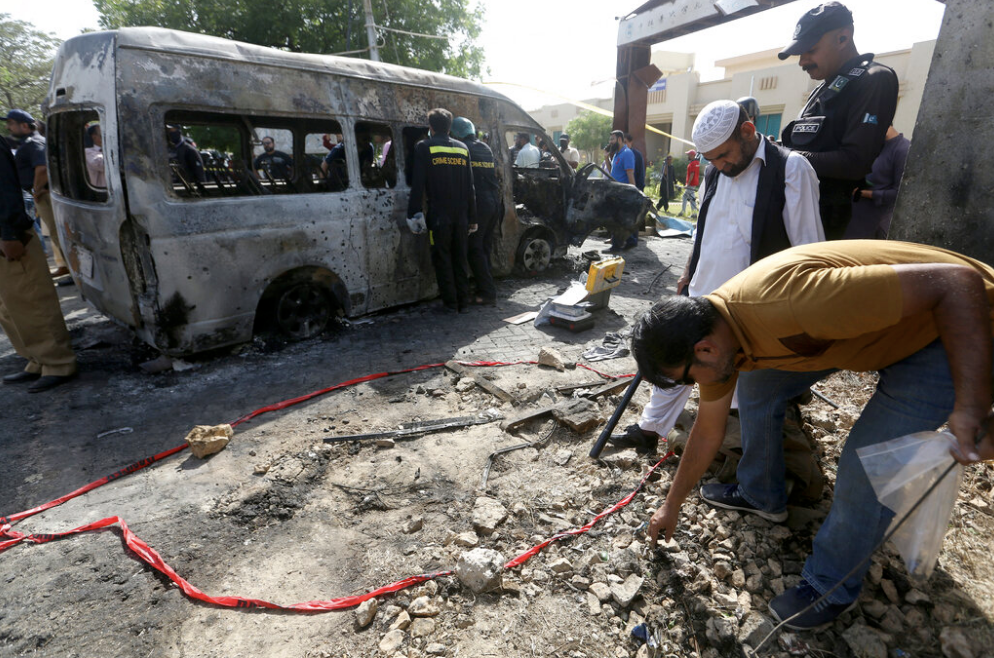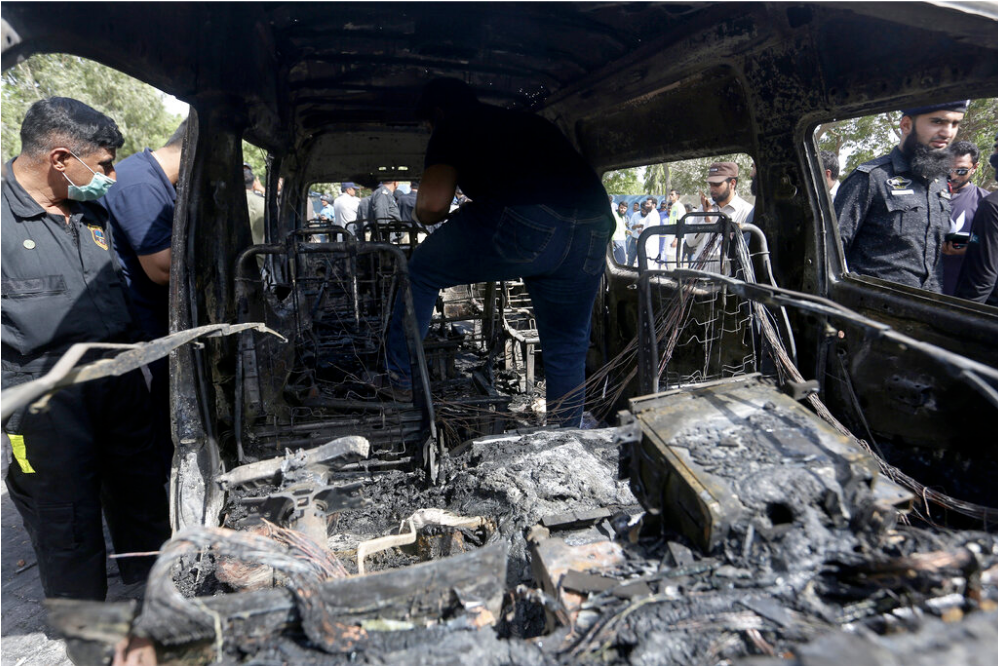Suicide Bomber in Karachi killed Three Chinese teachers, Pakistani Driver
Police officers and journalists gathered at the scene of the bombing just outside the Confucius Institute at the University of Karachi in Karachi, Pakistan on Tuesday, April 26, 2022. Photo: Fareed Khan/ Associated Press
A van inside a university campus in South Pakistan was bombed resulting in the death of three Chinese teachers and their Pakistani driver this Tuesday. A separatist militant group, Baloch Liberation Army (BLA), claimed responsibility for the attack.
CCTV footage revealed a woman in a burqa detonated the bomb whilst standing outside the entrance of the Confucius Institute at the University of Karachi as the van approached the entrance. A spokesperson from BLA claimed the woman was a suicide bomber named Shari Baloch (under the alias Bramsh) and carried out the attack.
The director of the Chinese-built institute was one of the three Chinese people killed in the recent bombing. The attack is the first major attack against Chinese nationals in Pakistan since July 2021, when nine Chinese nationals were killed in a bus bombing in Dasu by the Pakistani Taliban.
According to University spokesman Mohammad Farooq, a fourth Chinese national and a Pakistani guard, who were present in the van, were also wounded as a result of the bombing.
The Chinese Embassy urged Pakistan in a statement on their website, “to make every effort to treat the wounded, conduct a thorough investigation of the attack, and severely punish the perpetrator.” The embassy later asked that Pakistan ensure the safety of Chinese nationals in the country.
The attack put pressure on the recently appointed Prime Minister Shehbaz Sharif, who said in a statement “I am deeply grieved on the loss of precious lives including of our Chinese friends in the heinous attack in Karachi today.”
An image of the inside of the bus bombed on Tuesday at the University of Karachi. Photo: Fareed Khan/Associated Press.
The separatist group, BLA, is based in the southwestern region of Balochistan close to Karachi, which borders Afghanistan, Iran, and the Arabian Sea. Other attacks on Chinese people have taken place in the region as separatist militant groups revolted against authorities that kept China in the region for decades.
Balochistan is a place of contention, as it houses a deep-water port in Gwadar city that is being developed by Beijing under the China Pakistan Economic Corridor (CPEC) which falls under the umbrella of the Belt and Road Initiative to expand trade between South Asia and China. The area has Pakistan’s largest natural gas field as well as many undiscovered reserves that BLA does not want China to have access to.
BLA was against Pakistan growing its relationship with China by letting them into Balochistan. BLA wants a greater share of the natural resources in the area such as mines, and minerals. One of the few Chinese companies in the region also operates a major gold and copper mine that BLA felt was their land. The militant group attacked gas projects, infrastructure, and security forces as a form of rebellion.
In more recent years, BLA claimed they targeted Chinese nationals after Beijing ignored the warnings not to enter deals and agreements related to Balochistan as reported by Reuters. They claimed the attack on the Pakistan Stock Exchange Building in 2020 and the attack on the Chinese consulate in 2018 as well.
The Confucius Institute in Karachi was previously accused of using propaganda on campus. In Chinese media, the attack was linked to Uyghur movements and other Islamist terrorism. But when China entered Balochistan under the CPEC, it caused widespread local anger in those counties. BLA asked for Pakistani security forces to be taken out of Balochistan, as they seek independence for the region from Pakistan and China.


